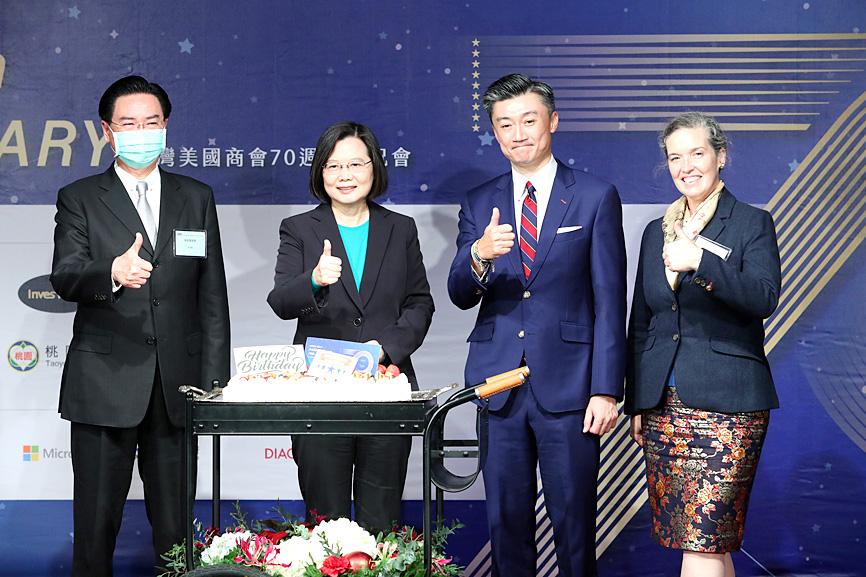President Tsai Ing-wen (蔡英文) on Wednesday expressed the government’s interest in taking part in an Indo-Pacific economic framework that the US proposes to launch early next year.
“We look forward to taking part in the recently announced Indo-Pacific economic framework,” Tsai told an event in Taipei that marked the 70th anniversary of the American Chamber of Commerce in Taiwan (AmCham).
Tsai was eager to underscore the nation’s trade partner credentials, saying that Taiwan has transformed itself into a tech hub for Asia, while building a flexible and diverse economy that would allow it to play a crucial role in the proposed pact.

Photo: CNA
The US Department of Commerce said that talks on the pact are in the preliminary stages.
Reuters last month reported that the US government plans to launch the framework early next year, citing comments US Secretary of Commerce Gina Raimondo made at a news conference.
At that time, Raimondo said that the framework would not take the form of a traditional trade agreement, emphasizing that it could involve areas such as the digital economy, supply-chain resiliency, infrastructure, export controls and clean energy.
American Institute in Taiwan (AIT) Director Sandra Oudkirk said that the US has resolved to deepen cooperation with Taiwan across various economic and commercial issues, ranging from supply chains to emerging technologies.
Without elaborating, Oudkirk said that the AIT intends to establish a business advisory group to provide recommendations to Taiwan and the US on ways to enhance bilateral economic and commercial ties.
Describing Taiwan as a critical security partner, Oudkirk said that bilateral cooperation would increasingly focus on countering cybersecurity threats.
“We must work together to build a culture of cybersecurity that includes business, government, academia and society at large,” she said, adding that good data and reliable information are the foundation of democratic systems and national security.
Established in 1951, AmCham is a business organization representing about 1,000 members from more than 500 US and international companies.

Intel Corp chief executive officer Lip-Bu Tan (陳立武) is expected to meet with Taiwanese suppliers next month in conjunction with the opening of the Computex Taipei trade show, supply chain sources said on Monday. The visit, the first for Tan to Taiwan since assuming his new post last month, would be aimed at enhancing Intel’s ties with suppliers in Taiwan as he attempts to help turn around the struggling US chipmaker, the sources said. Tan is to hold a banquet to celebrate Intel’s 40-year presence in Taiwan before Computex opens on May 20 and invite dozens of Taiwanese suppliers to exchange views

Application-specific integrated circuit designer Faraday Technology Corp (智原) yesterday said that although revenue this quarter would decline 30 percent from last quarter, it retained its full-year forecast of revenue growth of 100 percent. The company attributed the quarterly drop to a slowdown in customers’ production of chips using Faraday’s advanced packaging technology. The company is still confident about its revenue growth this year, given its strong “design-win” — or the projects it won to help customers design their chips, Faraday president Steve Wang (王國雍) told an online earnings conference. “The design-win this year is better than we expected. We believe we will win

Chizuko Kimura has become the first female sushi chef in the world to win a Michelin star, fulfilling a promise she made to her dying husband to continue his legacy. The 54-year-old Japanese chef regained the Michelin star her late husband, Shunei Kimura, won three years ago for their Sushi Shunei restaurant in Paris. For Shunei Kimura, the star was a dream come true. However, the joy was short-lived. He died from cancer just three months later in June 2022. He was 65. The following year, the restaurant in the heart of Montmartre lost its star rating. Chizuko Kimura insisted that the new star is still down

While China’s leaders use their economic and political might to fight US President Donald Trump’s trade war “to the end,” its army of social media soldiers are embarking on a more humorous campaign online. Trump’s tariff blitz has seen Washington and Beijing impose eye-watering duties on imports from the other, fanning a standoff between the economic superpowers that has sparked global recession fears and sent markets into a tailspin. Trump says his policy is a response to years of being “ripped off” by other countries and aims to bring manufacturing to the US, forcing companies to employ US workers. However, China’s online warriors